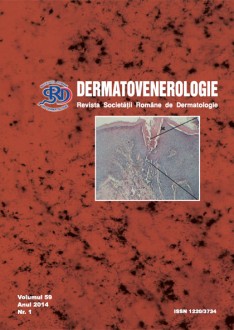The discovery and practical use of TNF alpha inhibitors revolutionised the therapeutic approach of patients suffering from moderate to severe psoriasis.
However, not all patients respond well to this treatment; the absence of the response to the treatment with TNF alpha inhibitors (primary non-responders), decrease of efficiency in time (secondary non-responders) and the occurrence of adverse events have created the need for new therapeutic strategies. Therefore, biological switching has entered current practice.
This paper presents the case of a 74-year old patient, diagnosed with moderate-severe psoriasis approximately 4 years ago. The patient was also diagnosed with undifferentiated seronegative arthritis (in 2000) and developed extended necrotic lesions at the injection site upon resuming the therapy with adalimumab. The biological switch to another TNF inhibitor (etanercept) proved to be an efficient and well-tolerated therapeutic option. The patient’s evolution was favourable, with significant improvement of cutaneous and articular symptoms. The paper discusses relevant data from specialised literature.


